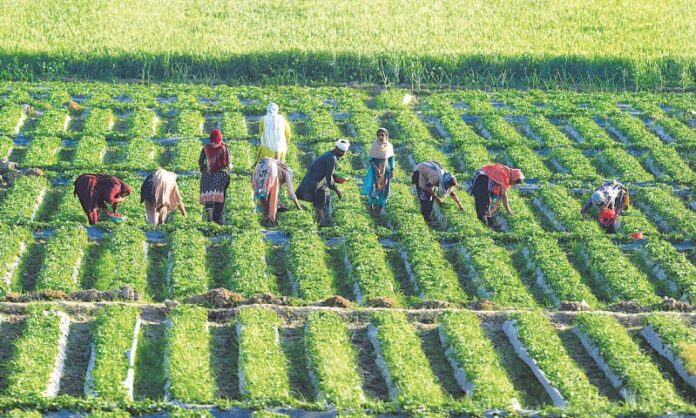- Advertisement -
ISLAMABAD, Jan 15 (APP):The speakers at a roundtable conference on Wednesday urged farmers to adopt climate-smart water and land management practices to address agriculture issues.
“Most of the traditional farming practices are not ecologically sustainable. They misuse natural resources, reducing soil fertility, causing erosion, and contributing to climate change,” they said at the discussion titled ‘Addressing the Food Systems-Climate Change Nexus for a Resilient Future’, organized by WWF-Pakistan and the Global Alliance for Improved Nutrition (GAIN) here.
The experts stressed the need to develop policy actions that regulate access and use of resources such as land, water, and biodiversity in a sustainable way.
Director General WWF-Pakistan, Hammad Naqi Khan said that for Pakistan, climate change is primarily water change, highlighting the urgency of agricultural adaptation, and also added that there is a need to address the loss of prime farmland to urbanization.
He noted, “key policy recommendations and action plans are required for concrete and actionable decision-making on food production and consumption. Effective stakeholder engagement and coordination are not only crucial for this, but also to drive sustainable agriculture practices and ensure food security for the country’s growing population.”
Country Director Global Alliance for Improved Nutrition (GAIN), Farrah Naz stated, “The critical link between climate change and nutrition can no longer be neglected. We must prioritize the development of better food systems and secure global financing to ensure everyone has access to affordable, nutritious food. Investing in climate-resilient agriculture and nutrition programmes is not only a moral imperative, but also a sound economic strategy for building healthier, more sustainable communities.”
The event discussed the plans to institutionalize integrated water resource management to balance agricultural needs and environmental sustainability. To achieve the NDCs targets, it was also proposed to implement large-scale carbon sequestration programmes through agroforestry and improved grassland management.
Policy Expert Ali Tauqeer Sheikh noted, “Current climate finance systems are falling short. We need a new approach that integrates water management, leverages private-sector expertise, and harnesses innovative financing tools to build stronger, more resilient communities in the face of climate change.”
He emphasized, “this new approach must support climate-resilient agriculture, promoting sustainable farming practices and ensuring global food systems can withstand the impacts of climate change.”
NDCs Focal Point of Pakistan, Arif Goheer presented Pakistan’s progress on the NDC 3.0 and shared that the integration of the food and agriculture sectors is central to the country’s planning.
Dr Afridi, Member Social Sciences Division PARC also spoke at the event.
The roundtable brought to debate the priority areas and goals identified by WWF-Pakistan and GAIN, which could help achieve better food production in the country. It was proposed to improve access to nutritious and sustainable foods through targeted subsidies and infrastructure investments for underserved markets, focusing on gender inclusivity.
The participants recommended undertaking governance analyses to identify gaps in food system policies?
The roundtable aimed to foster dialogue and integrate the key actionable strategies at the intersection of food systems, nutrition and climate change, given the upcoming Nationally Determined Contributions (NDCs) under the Paris Agreement that is being prepared.
The interactive roundtable session with experts and participants culminated in the formulation of critical pathways for the enhancement of the country’s ambition and climate action.
The event discussed the key actions for NDCs recommended by the stakeholders and also explored innovative financial mechanisms, implementing pathways, and robust monitoring frameworks that are essential for achieving transformative and inclusive outcomes in the agriculture sector.

